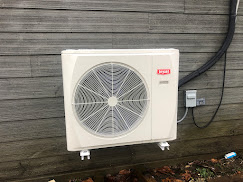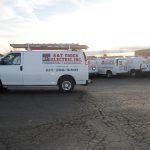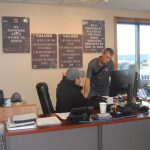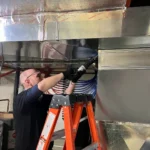Air conditioners are crucial for keeping your home comfortable, especially during the scorching summer months. However, like all mechanical systems, your AC may start showing signs of wear and tear over time. Knowing when it needs attention is key to preventing bigger issues. In this article, we’ll dive into the top signs that your air conditioner needs repair, along with helpful HVAC troubleshooting tips to keep your system running smoothly.
1. Insufficient Cooling or No Cooling at All
One of the most common signs that you need an air conditioner repair is when your system struggles to cool your home. If your air conditioner is running but not delivering cool air, something is likely wrong. This could be caused by several issues:
Dirty Filters
A dirty air filter can restrict airflow, making it difficult for your AC to cool the air properly. Over time, dust and debris accumulate, leading to inefficiency. Regularly cleaning or replacing the air filter can prevent this problem.
Refrigerant Leaks
If your air conditioner is low on refrigerant due to a leak, it won’t cool your home effectively. Low refrigerant levels reduce your system’s cooling capacity, which means your house may stay warm even with the AC on full blast.
Compressor Issues
The compressor is the heart of your air conditioning system, responsible for circulating refrigerant. If it fails, your AC won’t be able to cool your home. A malfunctioning compressor will likely need professional air conditioner repair to avoid complete system failure.
HVAC Troubleshooting Tip:
Start by checking your thermostat settings. Make sure the thermostat is set to “cool” and the temperature is correctly adjusted. Then, inspect the air filter and replace it if it’s dirty. If the problem persists, contact a professional to check for refrigerant leaks or compressor issues.
2. Strange Noises Coming From the Unit
If your air conditioner is making odd noises, it’s a sure sign something is wrong. Whether it’s grinding, squealing, or banging, these sounds shouldn’t be ignored. These noises often indicate the need for an immediate air conditioner repair.
Squealing
A squealing noise could suggest that the motor’s belt is worn or the bearings in the fan motor are failing. Ignoring this sound could lead to a larger repair down the road.
Banging
If you hear banging, there might be loose or broken parts within the compressor. This is a serious issue that requires immediate attention.
Hissing
A hissing sound might indicate a refrigerant leak, while grinding noises can be a sign of worn-out motor bearings.
HVAC Troubleshooting Tip:
Turn off your air conditioner and inspect the unit for obvious external damage or debris. If the noise continues after restarting, call an HVAC technician to diagnose the issue.
3. Frequent On and Off Cycling
Air conditioners typically follow a consistent cycle of cooling. If your AC is turning on and off too frequently, this could be a sign of a problem known as short cycling. Short cycling can be caused by:
Low Refrigerant Levels
When refrigerant levels are low, the AC unit may cycle too quickly in an attempt to cool the home. This not only affects your comfort but also places extra strain on the system.
Dirty Air Filters
Clogged air filters can also cause frequent cycling, as restricted airflow leads the system to overwork.
HVAC Troubleshooting Tip:
First, replace the air filter and ensure that the thermostat is working correctly. If short cycling continues, it’s time to call a professional for air conditioner repair.
4. Unpleasant Odors
If you notice strange odors coming from your air conditioner, this is a clear warning sign. Different types of odors can point to different issues:
Burning Smell
A burning odor usually indicates electrical problems or overheating components. This is a sign that your system may require immediate air conditioner repair to avoid further damage.
Musty Smell
A musty odor suggests mold growth, either in your ducts or on the evaporator coil. Mold can develop due to excess moisture in the system, leading to poor indoor air quality and potential health issues.
Sour Smell
If you detect a sour smell, bacteria may be growing inside the system. This is often found in the condensate drain or drip pan.
HVAC Troubleshooting Tip:
Turn off your AC and check for blockages in the condensate drain. If the smell persists, contact an HVAC professional for a thorough inspection and cleaning.
5. Increased Humidity Levels
A properly functioning air conditioner should keep humidity levels in check. If your home feels more humid than usual, even when the AC is running, this could indicate that your air conditioner is not working efficiently.
Possible Causes
This can be due to low refrigerant, clogged filters, or an undersized system. High humidity inside your home not only makes the environment uncomfortable but can also encourage mold growth.
HVAC Troubleshooting Tip:
Make sure the air filter is clean and the thermostat is set to “auto” rather than “on.” If the humidity problem continues, have a technician evaluate the refrigerant levels and system capacity.
6. Water Leaks Around the Unit
Water pooling around your air conditioner is a sure sign of a problem. Air conditioners produce condensation, but it should be draining properly. If not, you may have:
Clogged Condensate Drain
The condensate drain removes moisture from the system. If this becomes blocked, water can back up and leak around the unit.
Frozen Evaporator Coil
A frozen coil can occur due to low refrigerant or restricted airflow. When the ice melts, it causes excess water to leak from the system.
HVAC Troubleshooting Tip:
Turn off the air conditioner and check the condensate drain for blockages. If you can’t clear the drain or find the leak source, call a professional for air conditioner repair.
7. Rising Energy Bills
If your energy bills are suddenly higher, despite no significant increase in usage, your air conditioner may be operating inefficiently. This inefficiency could be due to:
Dirty Components
Dirty filters, coils, or ductwork can make your system work harder to cool your home, leading to higher energy consumption.
Old Age
Older air conditioners naturally lose efficiency over time. If your unit is more than 10–15 years old, it may be approaching the end of its life.
HVAC Troubleshooting Tip:
Start by cleaning or replacing the air filter. If your system is older or continues to drive up energy bills, it might be time for an upgrade to a more efficient model.
8. Constant Thermostat Adjustments
If you find yourself constantly adjusting the thermostat to maintain comfort, there may be an issue with either the thermostat or the air conditioner itself.
Faulty Thermostat
A faulty or improperly calibrated thermostat can fail to communicate with the AC unit, leading to inconsistent cooling.
Inconsistent Cooling
If certain rooms are warmer than others, this could be due to issues like leaky ductwork, low refrigerant, or an undersized AC system.
HVAC Troubleshooting Tip:
Try resetting the thermostat or recalibrating it. If the issue persists, call a technician to inspect both the thermostat and the air conditioning system.
Air conditioners are an integral part of maintaining comfort in your home, especially during the hotter months. By recognizing the signs that your system needs air conditioner repair and performing some basic HVAC troubleshooting, you can avoid major issues and costly repairs down the line. Regular maintenance like changing air filters and scheduling annual inspections can extend your AC’s lifespan and keep it running efficiently. If you notice any of the warning signs mentioned above, don’t hesitate to contact a professional for an inspection and necessary repairs.
FAQs: Top Signs Your Air Conditioner Needs Repair
What are the most common signs that my air conditioner needs repair?
The most common signs include insufficient cooling, strange noises (like squealing or banging), unpleasant odors, frequent on and off cycles (short cycling), and rising energy bills. These issues indicate that your AC unit may need professional attention.
Why is my air conditioner leaking water?
Water leakage is often caused by a clogged condensate drain or a frozen evaporator coil. Both issues require repair to prevent further damage to the system and your home. It’s best to contact an HVAC professional to diagnose and fix the problem.
Why is my air conditioner making a loud noise?
Loud noises, such as grinding, banging, or squealing, usually indicate issues with the compressor, fan motor, or a loose part. These sounds are a sign that your air conditioner needs repair as soon as possible to prevent more extensive damage.
How can I tell if my air conditioner has a refrigerant leak?
A refrigerant leak may be indicated by reduced cooling efficiency, hissing noises, or frost buildup on the unit. If you suspect a leak, contact a technician to check the refrigerant levels and perform any necessary repairs.
What should I do if my air conditioner isn’t cooling properly?
First, check your thermostat settings and replace or clean the air filter. If your air conditioner is still not cooling properly, there may be a more serious issue, such as a refrigerant leak or compressor problem, which requires professional air conditioner repair.







